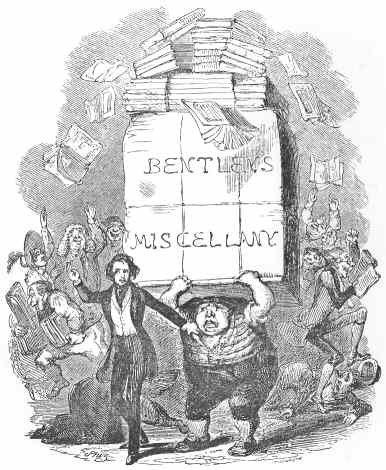Transcribed from the [1897] Roxburghe Press edition by David Price,
Pickwickian
Manners and Customs,
BY
PERCY FITZGERALD.
the
ROXBURGHE PRESS,
Limited,
FIFTEEN, VICTORIA STREET,
westminster.
Inscribed
to
AUGUSTINE BIRRELL, M.P.
p. 7PICKWICKIAN MANNERS AND CUSTOMS.
No English book has so materially increased the general gaietyof the country, or inspired the feeling of comedy to such a degree as, “The Pickwick Club.” It is now some “sixty years since” this book was published, and it is still heartily appreciated. What English novel or story is there which is made the subject of notes and commentaries on the most elaborate scale; whose very misprints and inconsistencies are counted up; whose earliest “states of the plates” are sought out and esteemed precious? “Pickwick,” wonderful to say, is the only story that has produced a literature of its own—quite a little library—and has kept artists, topographers, antiquaries, and collectors all busily at work.
There seems to be some mystery, almost p. 8miracle, here. A young fellow of four-and-twenty throws off, or rather “rattles off,” in the exuberance of his spirits, a never-flagging series of incidents and characters. The story is read, devoured, absorbed, all overthe world, and now, sixty years after its appearance, new and yetnewer editions are being issued. All the places alluded to and described in the book have in their turn been lifted into fame, and there are constantly appearing in magazines illustratedarticles on “Rochester and Dickens,” “Dickens Land,” “Dickens’ London,” and the rest. Wonderful! People, indeed, seem never to tire of the subject—the same topics are taken up over and over again. The secret seems to be that the book was a living thing, and still lives. It is, moreover, perhaps the best, most accurate picture of character and manners that are quite gone by: in it the meaning and significance of old buildings, oldinns, old churches, and old towns are reached, and interpreted inmost interesting p. 9fashion; the humour, bubbling over, and never forced, and always fresh, is sustained through some sixhundred closely-printed pages; all which, in itself, is a marvel and unapproached. It is easy, however, to talk of the boisterousness, the “caricature,” the unlicensed recklessness of the book, the lack of restraint, the defiance of the probabilities. It is popular and acceptable all the same. But there is one test which incontestably proves its merit, and supplies its title, to be considered all but “monumental.” This is its prodigious fertility and suggestiveness.
At this moment a review is being made of the long Victorian Age, and people are reckoning up the w

